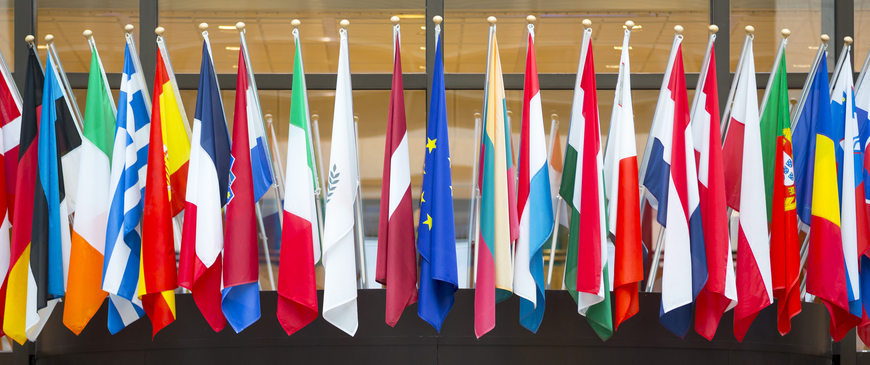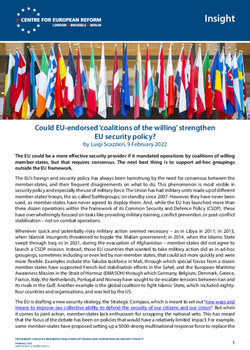
Could EU-endorsed 'coalitions of the willing' strengthen EU security policy?
The EU could be a more effective security provider if it mandated operations by coalitions of willing member-states, but that requires consensus. The next best thing is to support ad-hoc groupings outside the EU framework.
The EU’s foreign and security policy has always been hamstrung by the need for consensus between the member-states, and their frequent disagreements on what to do. This phenomenon is most visible in security policy and especially the use of military force. The Union has had military units made up of different member-states’ troops, the so-called ‘battlegroups’, on standby since 2007. However, they have never been used, as member-states have never agreed to deploy them. And, while the EU has launched more than three dozen operations within the framework of its Common Security and Defence Policy (CSDP), these have overwhelmingly focused on tasks like providing military training, conflict prevention, or post-conflict stabilisation – not on combat operations.
Whenever quick and potentially risky military action seemed necessary – as in Libya in 2011; in 2013, when Islamist insurgents threatened to topple the Malian government; in 2014, when the Islamic State swept through Iraq; or in 2021, during the evacuation of Afghanistan – member-states did not agree to launch a CSDP mission. Instead, those EU countries that wanted to take military action did so in ad-hoc groupings, sometimes including or even led by non-member states, that could act more quickly and were more flexible. Examples include the Takuba taskforce in Mali, through which special forces from a dozen member-states have supported French-led stabilisation efforts in the Sahel, and the European Maritime Awareness Mission in the Strait of Hormuz (EMASOH) through which Germany, Belgium, Denmark, Greece, France, Italy, the Netherlands, Portugal and Norway have sought to de-escalate tensions between Iran and its rivals in the Gulf. Another example is the global coalition to fight Islamic State, which included eighty-four countries and organisations, and was led by the US.
When it comes to joint action, member-states lack enthusiasm for scrapping the national veto.
The EU is drafting a new security strategy, the Strategic Compass, which is meant to set out “new ways and means to improve our collective ability to defend the security of our citizens and our Union”. But when it comes to joint action, member-states lack enthusiasm for scrapping the national veto. This has meant that the focus of the debate has been on policies that would have a relatively limited impact. For example, some member-states have proposed setting up a 5000-strong multinational response force to replace the battlegroups. Others think that the Union would be more effective if it tasked groups of countries – so-called coalitions of the willing – with implementing a (civilian or military) operation on the EU’s behalf. Article 44 of the Treaty on European Union allows the Council to entrust an operation to a group of willing and able member-states. The member-states so tasked, together with the EU High Representative for Foreign Affairs and Security Policy, would agree among themselves how to carry it out.
In the aftermath of the chaotic international withdrawal from Afghanistan in the summer of 2021, European countries realised that they would have struggled to carry out an evacuation of Kabul airport without the US. The notion of using EU-endorsed coalitions to increase the Union’s capacity to conduct demanding operations gained momentum. Germany’s then foreign minister Annegret Kramp-Karrenbauer argued that coalitions of willing member-states should be empowered to act on behalf of the EU by using Article 44. The idea was backed by Finland, the Netherlands, Portugal and Slovenia, and the leaked first draft of the Strategic Compass also mentions Article 44.
An operation in the framework of Article 44 would have several potential advantages over a purely ad-hoc grouping of member-states. First, it would take place under an EU flag and would therefore have greater political legitimacy. Second, the EU would bear some of the costs of such an operation (as with a regular CSDP one), which may encourage member-states to take part, and could be an incentive to bring existing ad-hoc operations like EMASOH under an EU umbrella. Third, launching operations under Article 44 could also make participation easier for member-states that have problems participating in ad-hoc groupings, especially Germany, which has constitutional restrictions on deployments outside multilateral frameworks. Fourth, the EU could potentially co-ordinate an operation under an EU flag more closely with other activities in the same geographical area, such as humanitarian aid delivery and development co-operation projects.
An Article 44 operation would also have several significant advantages compared to a normal CSDP operation. It could allow the EU to launch an operation more quickly than an ordinary CSDP mission, as the cumbersome process of trying to find enough troops from willing member-states for an operation, which can sometimes take months, would be bypassed. Another advantage of Article 44 over a regular CSDP operation would be the much greater degree of flexibility for contributing member-states. There are some ambiguities over how exactly Article 44 would work, but it is clear that although the EU would formally remain in charge of the operation, participating member-states would have much more control over how an operation was run on a day-to-day basis. This could make them more willing to contribute.
Although the EU would formally remain in charge of the operation, participating member-states would have much more control over how an operation was run on a day-to-day basis.
The main obstacle to resorting to EU-endorsed coalitions of the willing is that, like virtually all decisions within EU foreign policy, the use of Article 44 requires unanimity between member-states. It would not necessarily be any easier to launch an Article 44 operation than a normal CSDP mission. Consensus will remain elusive, particularly if the proposed operation involved the risk of large-scale combat or could lead to reputational damage to the EU. The perceived failure of Western military interventions in Afghanistan, Iraq, Libya and now also in Mali means that scepticism about the usefulness of military intervention is widespread amongst European publics. Unless reaching consensus is easy, the advantages of using Article 44 as opposed to launching an ad-hoc operation outside of the EU framework would be very small for those states that are determined to intervene.
Trust could also be an issue. Member-states participating in an Article 44 operation would act on behalf of the EU as a whole, but with significant discretion in running the operation. This might make other member-states unwilling to agree to launching an operation, for fear of giving them carte blanche. Such concerns could lead some EU leaders to request tight control over the operation, which would decrease the incentives for member-states that wanted to act to do so within the framework of Article 44.
It may also be difficult to work with partners, because they would have very little input – as would also be the case with an ordinary CSDP operation. This could make it harder to work with non-EU member-states, or with Denmark, which has an opt out from CSDP. Finally, as with a normal CSDP operation, the costs covered by the EU would in principle be limited to the ‘common costs’ of the mission, which include support costs like the running of the headquarters or medical evacuation. These are normally around five to ten per cent of the overall costs of an operation. Unless member-states reform the current arrangements, or provide more generous funding for an Article 44 operation on an ad-hoc basis, financial considerations are unlikely to be a major factor when deciding whether to resort to Article 44.
If member-states clarify how they would go about implementing Article 44, and are willing to offer more substantial financial support, EU-endorsed coalitions of the willing may become a more appealing option for crisis management. But the limitations of Article 44 mean that there will continue to be strong incentives for member-states who want to carry out military operations, and need to act quickly, to resort to ad-hoc groupings outside of the EU framework. The EU’s proposed 5000-strong response force would face very similar challenges, given that its deployment would still depend on a unanimous decision of EU states.
Member-states should consider how to link such operations by ad-hoc groupings of states more closely to the EU. There is a range of ways in which the EU could provide support. For example, the Union could launch a CSDP operation in parallel to the activities of the grouping, so that their efforts are complementary. To some extent the EU has already done this, for instance with its training missions in Mali and Niger, which contributed to the broader efforts of the French-led coalition. However, as the first draft of the Strategic Compass suggests, there is further scope to deepen co-operation between CSDP and ad-hoc operations, for example by better integrating intelligence, logistics and medical support. Member-states should also look at how the EU could provide more funding to support ad-hoc groupings, including through the newly launched European Peace Facility, a fund outside of the main EU budget which finances CSDP operations and supports efforts to train and equip the EU’s partners.
In 2022, the EU finds itself surrounded by security challenges on almost every border. The member-states have widely differing strategic outlooks, depending on what they see as the main threats to their national security. That divergence will continue to make it hard for the 27 to reach consensus on foreign policy issues, and especially on launching military operations: the Union will not be a major military player. The Strategic Compass is likely to focus on incentivising joint research and development of military capabilities, and on tackling non-military threats such as cyber-attacks. But it would be a missed opportunity if the Compass did not consider how the EU could best support ad hoc groups of countries prepared to carry out operations in the interests of the Union, even when these may not be a priority for all the member-states.
Luigi Scazzieri is a senior research fellow at the Centre for European Reform.


Add new comment